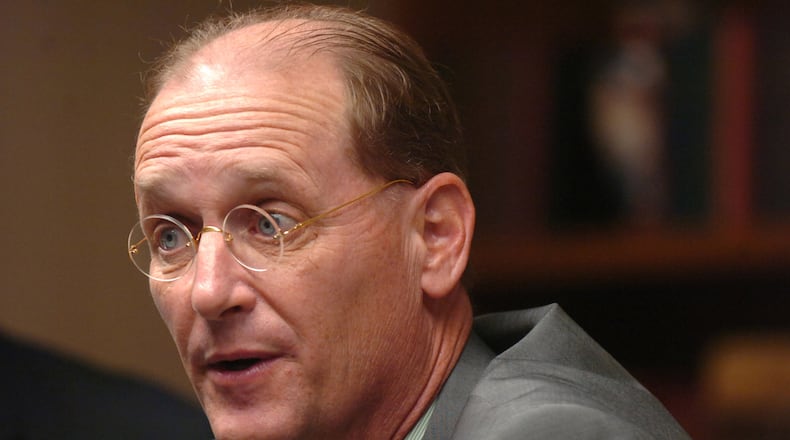Looking at the November prospect of seizing full control of Congress, Republicans in Washington have begun mapping out a to-do list.
More importantly, they have decided what to fight over among themselves: An obscure agency known as the Export-Import Bank of the United States.
Stifle that yawn. This is more important than it sounds. You can tell because, whenever the bank is mentioned, Georgia members of Congress zip their lips and run for cover.
In an effort to avoid an election-season shutdown of the federal government, House Speaker John Boehner on Tuesday announced that the bank’s charter would be extended until next June as part of a government-wide, temporary spending bill.
This would give a Republican-led Congress a full six months to conduct yet another knock-down, drag-out fight between the GOP’s tea-party adherents and its business faction.
Divisions run deep. Two years ago, every Georgia Republican in the U.S. House voted to kill the bank. As recently as July, U.S. Sens. Johnny Isakson and Saxby Chambliss voted to save it – while encouraging some reform.
The Export-Import Bank should more properly be called a trade agency. Its job is to help finance foreign purchases of U.S. exports.
Tea partyers want the bank condemned to oblivion as a nest of “crony capitalism.” But when it comes to Georgia, hardcore ideology is mere garnishment.
The meat of the matter, the real reason that your congressmen have kept mum, is that the fight over the Export-Import Bank has everything to with the U.S. aircraft industry – those who fly the planes versus those who make them. In Georgia, it pits hometown hero Delta Air Lines against business-plane manufacturer Gulfstream Aerospace Corp., a rising industrial star on the Georgia coast.
The fight is already creating some odd bedfellows.
Last spring in the state Capitol, Delta was one of the corporate giants whose quiet opposition killed a pair of “religious liberty” bills intended, in part, to protect those discomfited by the legal advances gay marriage is making through the courts.
Tea partyers referred to Delta (and Coke and Home Depot, too) in angry terms that made even the most worldly stockholder blush. But this summer, Delta made at least a temporary alliance with the foes of this spring.
In testimony before the House Financial Services Committee, Richard Anderson, Delta’s CEO, outlined the damage that the Import-Export Bank was doing to his company by underwriting sales of wide-bodied Boeing aircraft to Middle Eastern airlines backed by well-heeled governments.
“Emirates [airline] is backed by Dubai’s ruling family. It is not subject to corporate or income taxes, and it is not subject to a wide range of fees and excise taxes in the United Arab Emirates that are imposed on U.S. airlines in their home jurisdiction,” Anderson testified.
That amounts to a savings of about $20 million per plane, or one free plane for every eight new ones purchased, the Delta CEO estimated.
“That kind of deal is simply not available to airlines that must rely on market financing,” Anderson said.
Delta isn’t on board with the tea party’s call for a total dissolution of the bank – which would put the Atlanta-based company at odds with the U.S. Chamber. But the airline wants the trade agency prohibited from financing the sale of wide-bodied jets to airlines owned by governments – even if Europe won’t do the same when it comes to major Boeing competitors such as Airbus.
“The United States should lead the way to embrace market principles and eliminate government subsidies in this highly competitive industry,” Anderson testified.
Boeing has a limited economic presence in Georgia. But Gulfstream is an increasing force in the state.
Last December, the Import-Export Bank announced it would guarantee a $300 million loan for the Chinese purchase of eight Gulfstream aircraft. It was by far the largest Import-Export commitment to a Georgia business in several years.
At the February celebration, Gulfstream president Larry Flynn credited the trade agency for his company’s success. “The Bank’s ability to secure financing for many of our overseas customers has put us on a level playing field with our competitors,” Flynn said.
Sixty percent of Gulfstream’s back-orders were now from overseas, the president said. Export-Import intervention had allowed the company to nearly triple its hiring prospects.
Other Georgia companies have benefited as well – about $2 billion in shipments over the last seven years, worth about $5 billion in sales. Clearly, a congressman can’t pick a side in this fight without making someone very angry.
Only last Friday, Fred Hochberg, chairman of the Export-Import Bank, was to have been in Doraville to tour Purafil, a manufacturer and exporter of air filtration systems, which has had nearly $80 million in shipments underwritten by the agency.
Hochberg cancelled the Atlanta trip – essentially a campaign stop — when it became clear that House Republicans in Washington were preparing to kick a very large can into 2015.
But a postponed fight is an opportunity for both sides to gather forces for a bigger one. “Over time you’re going to see us elevate this issue,” said Anderson, the Delta CEO, to an Atlanta gathering of the Airports Council International – North America on Wednesday.
Anderson acknowledged that he and his company were becoming the face of the debate.
“It’s hard to stand up in a hangar of a thousand mechanics who are maintaining Air Force Two” – Delta services that plane and the U.S. State Department fleet, he explained – “and explain to them why their tax dollars are used by our government to provide below-market financing to government-owned airlines in the Middle East to take our jobs and our passengers away.”
About the Author
The Latest
Featured




